Searching for a solution in Palestine: Isn’t it time to put pressure on status quo?
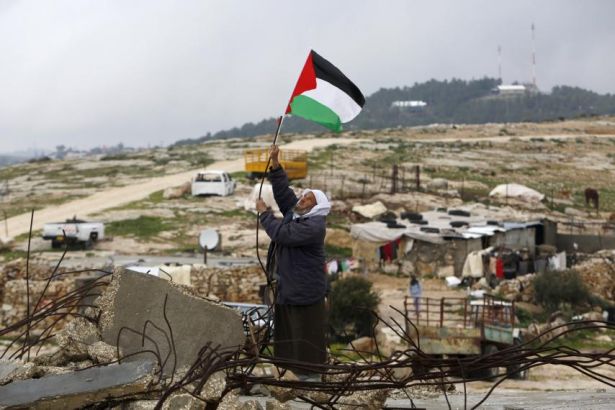
By soL columnist Aydemir Güler
The Middle East is one of the leading bases hosting a world-wide political crisis. As the crisis becomes more familiar, the word “solution” is heard more frequently. Here, we have several overlapping and complicated knots as well as axes of conflicts and networks of alliances in which the sides change so often.
The reality of the crisis and the discourse of solution…
Within this picture, the sides continue formulating aims, discussing different theses, drawing models and presenting their designs. However, the marching time does not make us closer to any of the models created by any regional designs. The region has been getting more familiar with chaos. The powerful one does not impose its own solution. The power is calculated by how much dominant you are in managing the chaos.
In the 19th century, modern capitalism that was becoming imperialist had replaced the old world of empires. The cards would be shuffled again and some would be wiped away not only from the table, but also from the entire world. Hereby, a new problem that was not existent in the Middle East before was invented. The Jews would return to the dreamland promised by the legend in the holy book. Today’s Israel-Palestine region had turned into an ethnic and religious paradox in thousands of years. This paradox has become blood-red within the process that the imperialist age pushed from the storied date until today.
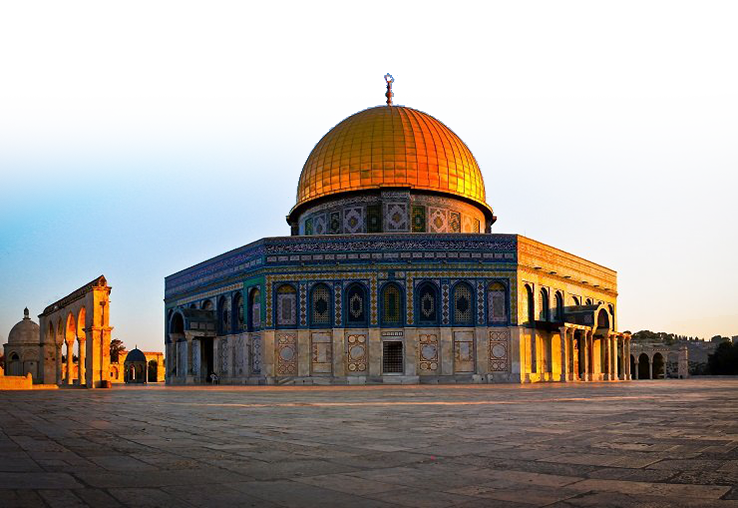
Searching for a solution has always come with the upsurge of the problem. Today we have the resolutions of the United Nations. It is the UN that recognizes Palestine as a state but entitles only an observer status and that regards Israel’s occupying, expansionist, and aggressive policies as legitimate in general, but is controlled by Israel’s protecting powers and bosses, the imperialist countries.
We have a framework of principles shaped by the fact that the Soviet Union and socialist countries, Palestinian national liberation movement, anti-imperialist powers and working class of the world had been on the same side. This framework records that Israel retreated from the borders it expanded in the war of 1967.
This framework involves the right of the Palestinians forced to migrate to come home. Nobody knows how this right will be exercised. When the Jews started to migrate into the region at the end of the 19th century, the region was a residential area. However, it is known that the population density then was incomparably low.
Now, besides the fact that there is little chance to find anything else than old houses in ruins, it is almost a rule that there are Jewish settlements near these houses.
This framework proposes that the east and west of the Jerusalem will be shared as the capital of two countries. It is entirely legitimate to request demolishing the wall of shame in Palestine. Then, is there another solution different than building a new wall cutting the city in order to operate the two sides of Jerusalem as two different states?
It is true that this framework supposes two sovereign neighbouring countries. But if per capita income of these two countries continue to be 40 thousand dollars for one and 1100 thousand dollars for the other, what kind of a sovereignty and neighbourhood would that be? By the way, per capita income in today’s imagined Palestine’s Gaza region goes down as low as 600 dollars!
The category of Jewish settler means that an illegal settlement policy in the occupied region. This illegality has been organized by the given law and the framework since the last 50 years in terms of the mentioned framework, and since the last 150 years in the hands of Britain. But what is going to happen with the children and grandchildren of the settlers? Is the refugee quota of the world going to be filled with alternative people? Is it possible for a struggle for liberation to continue without making the non-class based conflicts insignificant and without pushing them into the background?

We will be faced with these questions when the conditions of putting today’s framework of solution into practice are constituted. But we are not getting closer to these conditions, but rather we are moving away. The Israeli-Palestinian conflict has not been viewed, for a long time, in terms of imperialist-zionist colonialism and the freedom of a settled community. One side stays in its place, but against it, there is either the Palestinian bourgeoisie in various relationships, balances and negotiations with the Western imperialism or jihadists dreaming of becoming an alternative to the bourgeoisie.
In Israel, on the other hand, racist and religious powers are not getting weaker.
Imperialist capitalism is trying to manage this very deadlock and Palestine continues to bleed.
The engagement of imperialism with this deadlock, its history of adopting the management of the deadlock begins with the collapse of socialism. While socialism had survived as a different system of living concretely in front of people, capitalism had to create persuasive models for itself. It did; it made the people believe, with a pack of lies, that it is libertarian, and equality and freedom cannot exist together.
The system today does not suffer from this deadlock. Even if it does, it cannot get out of this swamp.
Revolutionary currents, on the other hand, have to define a realistic route to get out of the deadlock and to move towards a future where equality, liberty, justice and peace will rule. In these conditions, bourgeoisie ideologists’ belief that socialism and revolution are not “realistic” is not sensible at all. Because the ideology and politics of bourgeoisie no longer points out a certain objective or target. Those who do not have any objectives cannot say “your cause is not realistic”!
The Marxist movement, carefully, has to go beyond the body of knowledge reminded above.
DISTORTIONS IN MAPS
It is now a trend in media to show the regions controlled by Israel and Palestine together and point out the changes by time. According to this comparison, Palestine always loses and Israel continues to expand. This is a distortion. Moreover, there are several distortions made one after the other.
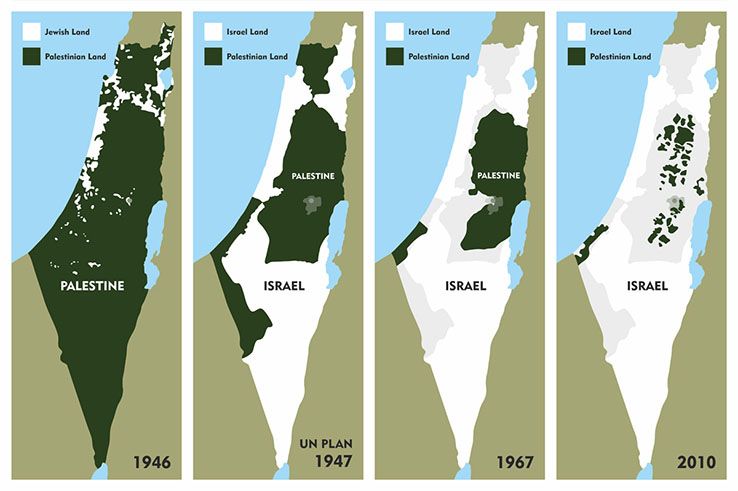
First of all, talking about Palestinian land before 1946 means that you do not consider the English mandate government as a problem. Some friends of Palestine may prefer this picture to ingratiate with imperialism. For those, the Ottoman colonialism before the First World War was already an ideal condition of liberty.
UN’s plan of sharing did not go beyond papers; we should not suppose there was such a reality. Palestine’s charlatan friends want to make people forget the Jordanian annexation. Although the annexation years were received positively by Arabs and Palestinians as a balance against Israel, Jordan was in a dependent relationship first with Britain and then with the US. That means the actual plan of the imperialism was to give Israel and Britain’s puppet Jordan partial control in mandate government. Israel captured a wider area than the UN’s two-state plan proposes and Gaza stayed in the hands of Egypt. Israel ended this situation with the war of 1968.
THE PALESTINE PROBLEM WAS CREATED BY IMPERIALISM, NOT BY PEOPLE
The long-time problem of the Middle East, the Palestine problem, aroused with the dissolution of “Ottoman peace”. The problem is a part of the Eastern problem. We are talking about the imperialist fight for sharing that became concrete by redrawing the map.
The return of Jews to the promised land can be a story in mythology. However, Zionism, in which the story turns into a global political movement, has been built up in the colonial and imperialist sharing processes. When Theodor Herzl from Budapest got in touch with Abdul Hamid in 1901 to purchase Palestine, he was not trying to make a lucky shot, but he was betting on the German-English balances. Approximately 15 years would be enough for the “Jewish state in Palestine”, which was romantically considered as Herzl’s dream, to become the official program of Britian’s foreign affairs. The Sykes-Picot agreement was signed in 1916 and the Balfour declaration in 1917. The west was clear about how the east would be shared.
SKYES - PICOT AGREEMENT
The Sykes-Picot agreement, the name of which came from the representatives who prepared the document in the name of Britain and France, was prepared by these two countries and approved by Tsarist Russia. According to this secret agreement dated 1916, Eastern Anatolia (Trabzon, Erzurum, Van, Bitlis, ...) would be distributed to Russia, Eastern Turkey including Adana and Diyarbakir, Syrian borders and Mosul to France, Haifa and Akka ports to Baghdad and Basra Britain. An Arab confederation would be formed under the control of France and Britain, Iskenderun would be a free port, and an international administration would be established in Palestine. Following the October Revolution, the Bolsheviks proclaimed that Russia had withdrawn from this sharing plan and revealed the secret agreement. Nevertheless, the provisions of the Sykes-Picot agreement constituted the infrastructure of the 1920 Sèvres agreement.
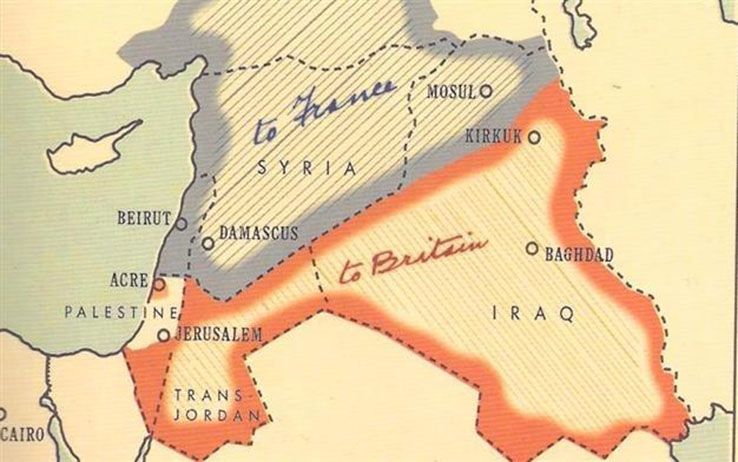
BALFOUR DECLARATION
The text, later called the First Balfour Declaration, is a letter sent to Lord Rothschild, who was one of the leading figures of the British Zionist movement, from Britain's minister of war, Lord Arthur Balfour, on 2 November 1917. The letter states that Britain has adopted a plan to establish a Jewish state on the Palestinian territory and is committed to supporting this struggle. In the process, this line would become the dominant strategy of Western imperialism. Nazi Germany's support for the struggle of the Arabs against Britain and Jews is significant within the framework of imperialist competition.
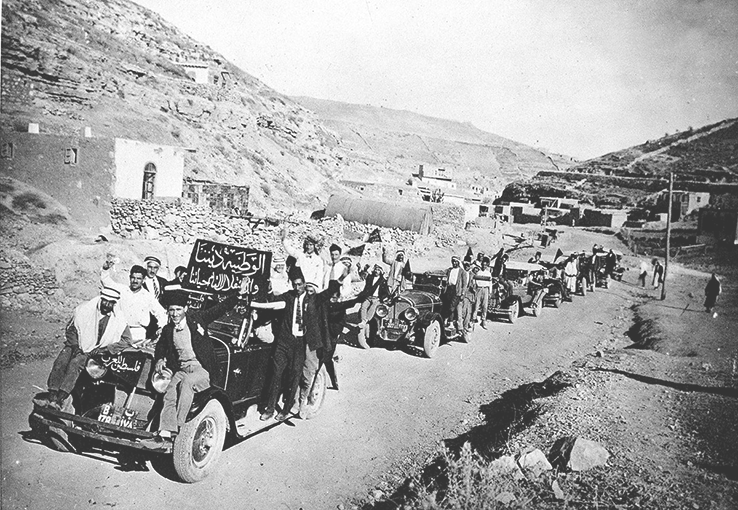
The gods did not promise Palestine to the Jews, nor did the Ottomans give it to them. This was a plan of imperialists.
However, the promised land was not empty at that time. Palestinians were living in Palestine. According to the Ottoman sources, of the 600 thousand people there in the mid-1th century, 80 percent were Muslim, 10 percent were Christian Arabs and 5-7 percent were Jews. Whatever the narratives from thousands of years ago say, the new state could only find a place for itself by pushing out and deactivating the settled people. It is likely that there were many settlements in Europe where the Jews had reached higher proportions within the population. But at the end of the old century and the beginning of the new millennium, Jews emigrated to Palestine in masses, not to anywhere else.
Today we are surprised by the hegemons' impudence, but the fact that the imperialists continued with their plans, even after the Bolsheviks revealed the secret plan of Sykes-Picot thanks to the October Revolution that opened access to state archives, shows that the impudence is historical. When Britain was still the hegemonic power and when it established a mandate regime in today's Israel-Palestine land, the Balfour and Sykes-Picot were at work. The demography of the region has changed. The society has changed and the characteristics of the class struggle...



